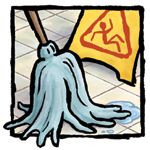Dot every poked eye, cross every bumped knee
When a team member has an accident, avoid liability claims by starting the paperwork early.
Each time a team member reports being injured or becoming ill because of a work-related incident, you need to document your investigation of the accident. Good records help you identify problem areas and avoid them in the future. And team members will be more likely to follow safe work practices and report hazards if they know people have gotten hurt or fallen ill in the past.

You can use an insurance reimbursement form or OSHA Form 301 to start the process, but you don't need both. Remember, though, that you must prepare a report even if you pay for treatment and don't submit the claim to insurance.
The employee's direct supervisor or someone appointed by the practice owner should conduct the primary investigation. And the report should focus on the circumstances that led up to the accident.
In some cases, this process is pretty simple, such as when a patient bites a team member. In other cases you may need to do a little detective work. For instance, if a team member complains of headaches, then passes out and must be treated at a hospital, reconstructing the facts may take more effort.
If you're the investigator, don't initially assign blame for the event or even judge whether a policy should be changed. Just try to figure out what happened. (See "Look online" for a helpful tool.) Once the investigation is complete, submit your report and notes to the practice's safety committee or to the practice owner or manager for review. The leadership team will then make any necessary policy changes or discipline team members for willful violation of safety policies.
Sometimes an accident is just an accident, and no further action is necessary. In other cases, individuals or groups may need additional training. Or you might need to restrict their duties if they have accident histories.
No matter how hard you try to be safe, accidents will happen. When they do, documenting the situation thoroughly can prevent a small cost from turning into a big one.
Philip Seibert, CVT, is an author, speaker, and consultant with SafetyVet in Calhoun, Tenn. Send questions or comments to ve@advanstar.com